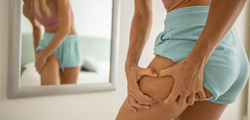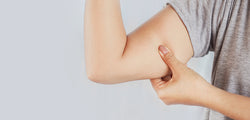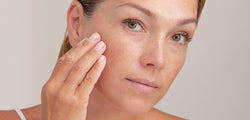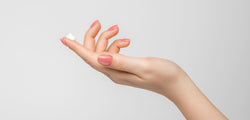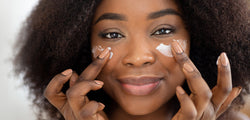
Retinol for Acne: Does it Work?
Table of Contents:
You probably already know that retinol is the gold standard in delaying the onset of wrinkles, fine lines, sun damage and other undesirable signs of aging. But did you know that this derivative of Vitamin A has a whole host of other skin benefits, some of which can be employed in dealing with acne? In fact, using retinol for acne is comparable to calling in the big guns when other acne-fighting ingredients such as benzoyl peroxide, salicylic acid, or even tea tree oil have failed to deliver meaningful results. But as much as we can appreciate the incredible role that this bad boy plays in addressing wrinkles and crow's feet, does retinol work for everyone as far as keeping acne out of bounds go? Well, let's see.
For starters, it is essential to recognize that prescription-strength retinoids have been leading the charge in the treatment of inflammatory acne for quite some time now. Retinol is the gentler and more affable version of this legendary vitamin A derivative, and its ability to smoothen out fine lines and boost collagen production is virtually unmatched. But some of the lingering questions that most people ask are, does retinol help with acne? or does retinol help with acne scars?
To answer these and more pertinent questions related to this, we will attempt to break down the various applications of retinol acne treatment. We will then round it off with a nugget or two on how to use retinol for acne especially in a day and age where it is mandatory to wear face masks outdoors.
Retinol Treatment for Blackheads, Pimples and other Types of Acne

Retinol is one of the few skin ingredients that can stimulate, trigger and control skin cell turnover rate. It's probably the reason it's a main player in almost all anti-aging serums. It's this ability to boost the proliferation of skin cells that dermatologists attempt to harness in retinol acne treatment. At the end of the day, acne is just the result of having clogged pores and blocked hair follicles. So, if you can find a way of keeping these pores open - by stimulating the rate at which dead cells are replaced by new ones - then you are halfway towards keeping blackheads and whiteheads away.
Speaking of which, using retinol for cystic acne has been gaining a lot of traction recently. As mentioned earlier, integrating a suitable retinol based cream such as Maryann Retinol Cream is an excellent way of preventing dead cells from clogging up your precious skin pores. But it is the dexterity of retinol to allow other medicated gels and creams to work better (since the pores are now open) that makes retin A hormonal acne treatment popular. In short, whatever other topical cream that you are trying to use to treat those big and angry-looking cystic pimples will work better if you throw a retin A for blackheads cream in the mix.
Another pointer that could explain why deploying retin A for pimples is such a no-brainer for dermatologists can be traced back to retinol's capacity to balance sebum production. And this is something that anyone with extremely oily skin which occasionally becomes a target for cystic breakouts would really appreciate. What's even better, by boosting the synthesis of collagen, retinol shrinks up those easily-inflamed pores in oily skin and lessens the chances of them getting clogged up in the future. If not for the minor side effects which we touch on later in the article, this already feels like the quintessential plan of how to get rid of subclinical acne.
Сan Retinol Cause Acne and Other Questions About the Side Effects of Retinoids

Fewer blocked pores, less oil to worry about and more natural exfoliation to look forward to sounds like the ultimate recipe for clear skin, right? Unfortunately, using retinol for closed comedones comes with its own unique set of side effects and challenges.
The first one among many is that it appears to make your acne appear worse as soon as you start using retin a for pimples. It's what skincare specialists and doctors like to refer to as the infamous retinol purging period, and it's typically characterised by dryness, skin peeling, and a slew of other debilitating and frustrating but short-lived outcomes.
So, naturally, at this point you may be asking yourself questions like, how long does retin A purging last? and Can retinol cause acne if I don't necessarily have a full-blown breakout?
The good news here is that this annoying phase should not take more than 2 to 6 weeks to clear, depending of course on a number of factors such as your skin type. At this juncture, it's crucial to bear in mind that retinol is not necessarily to blame for these highetened breakouts. Actually, the pimples and zits that you get during this Retin A purge phase would still have developed in the long run even without the involvement of retinol. The vitamin A derivative only fast-forwards this eventuality and speeds up their inevitable appearance. So don't fret over dead-end questions like, 'Why is Retin-A making my acne worse?" At times, we have to go through the worst before finally bustling into the glorious sunshine.
That said, there are several measures that you can take to temper the side effects of retinoids and make your experience less traumatizing. This includes;
- Staying hydrated: Drinking ample fluids appears to tone down the irritability of this purge phase since you won't have to worry about dry skin.
- Stay away from direct sunlight: Retinol is notorious for making your skin ultra-sensitive to the sun's unforgiving UV rays. You may want to stay from the sun during the first two weeks of adopting retinol. And in the few instances that you cannot avoid it, be sure to wear a decent sunscreen just to be safe.
- Using a good moisturizer: Again, your skin will look and feel flaky in the first few weeks of starting to use retinol to bring cystic acne under control. A moisturizer counters this by keeping the epidermis sufficiently hydrated.
Retinol with Benzoyl Peroxide
Like retinol, benzoyl peroxide is another celebrated acne-fighting ingredient known for its efficiency in drying out cystic pus-filled pimples and sloughing off dead cells. So, all factors held constant, combining these two superstar compounds should theoretically help you get rid of blackheads or whiteheads faster, right?
Unfortunately, that is far from the truth. Using benzoyl peroxide with retinol is a zero-sum game which is not even advisable in the first place. Benzoyl peroxide can and will oxidize the retinol rendering less effective if not entirely useless. Besides, doing this opens up your skin to a host of other predisposing factors such as too much substance overload which could aggravate your symptoms further.
Retinol vs Salicylic Acid
Salicylic acid, just like retinol, is arguably one of acne's greatest foes. Again, it seems like a logical thing to combine this dynamic duo to hasten the process of zapping zits and bursting pits. Nonetheless, that's not the case either. Applying salicylic acid and retinol together can exacerbate dryness and excessive peeling of the skin. You don’t want this extra irritation, especially if you are just getting used to incorporating retinol into your beauty routine.
So, in the battle of retinol vs salicylic acid, you may want to choose one over the other or, at the very least, apply them during different times (use retinol at night and salicylic acid during the day) to avoid any chances of interaction. Come to think of it, and this actually makes a lot of sense since retinol is highly unstable under direct sunlight and should never be used if you are going to be walking in the sun.
In Closing
If you have been struggling with severe to moderate breakouts that take too long to go away despite trying different remedies, maybe it is time for retinol for acne to take charge of the treatment process. Yes, it is hardly a walk in the park, and you may have to get used to a few inconveniences such as excessive peeling of your skin and temporary bigger/angrier pimples, but at the end of the day, it may just be worth it.

